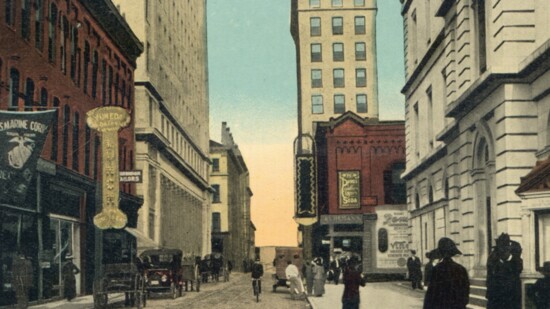This month, the Knoxville History Project showcases a selection of podcast episodes that you can listen to online, highlighting some of the most interesting of the city’s old stories that still have relevance today. In addition to the four stories highlighted here, other podcast episodes include: “The Saturnalia of 1893,” “In Walked Mr. Ghost,” “The Conjure Man,” “Creature of the Cumberlands” and more.
Find all episodes by searching for “Knoxville Chronicles” on your preferred podcast app or point your browser directly to buzzsprout.com/2119094 or via KnoxvilleHistoryProject.org
Maggie Lattimore: the Matron of Depot Street
When the Southern Railway Station on Depot Street opened in 1903, there was one face that everyone got used to seeing every day—Maggie Lattimore, the station’s matron. Although she was an African American woman in a segregated train station, Lattimore often seemed to be in charge, catering to passengers of all colors. If there was trouble, she would fix it. Dressed in an immaculate uniform and white cap, one journalist described her as “always ready for the arrival of passenger trains, 12 hours every day and Sunday. She was well informed about affairs in the city and could direct persons to places they were hunting.” Maggie Lattimore worked at the station until she was 80 years old. On her retirement, Southern Railway gave her a medal “as large as two silver dollars” for a half-century of service.
IMAGE: South Railway Station. (Alec Riedl Knoxville Postcard Collection/KHP.)
The Immortal Kiosk and the Hottest Day
The elegant old weather kiosk on the corner of Clinch Avenue and Market Street outside the Custom House looks like something built for an Exposition of the beaux-arts era. But in fact, it was originally installed in 1912. People used to gather around it to see what the federal weatherman had observed and what they might expect next. Back then, checking on the weather was a social event. So many people hung out around it, they earned a nickname – the Kiosk Leaners. Today, the relic is said to be one of America’s only remnants of the Weather Kiosk Era. It’s both a rarity and a landmark, and one very hot day, more than 90 years ago, it attracted a very large crowd.
IMAGE: Customs House on Clinch Avenue. (Alec Riedl Knoxville Postcard Collection/KHP.)
Love in the Time of Upheaval: The Cansler Elopement
The Cansler family had a big impact on Knoxville in the late 19th century and the first half of the 20th. In Mechanicsville, there’s a Cansler Street and a Cansler Building on University Avenue. Not far from there, off Western Avenue, is the old Laura Cansler School, a former “colored” elementary school, now home to Wesley House. In East Knoxville, there’s the Cansler Family YMCA. But the Cansler name wouldn’t be known if not for a love story. Charles W. Cansler, a pioneer of the African American genealogical narrative, published his family’s unusual history in his 1939 book Three Generations: The Story of a Colored Family in East Tennessee. That book preceded Alex Haley’s Roots by 37 years.
IMAGE: Cansler Family Reunion, 1911. (Beck Cultural Exchange Center.)
Matilda X
In 1856, before the Civil War, Dr. William J. Baker, with assistance from a few others including his suffering patient, hurried medical science along by performing one of the first hysterectomy surgeries in the United States here on Gay Street. Of that historic team of four surgeons, the youngest is the one best remembered today. Knoxvillians may recognize the name, even if they don’t remember right away where they’ve seen it. It’s the name of “Our Beloved Physician,” memorialized with the stout marble arch at the Knox County Courthouse on the corner of Gay and Main. At 23, Dr. John Mason Boyd helped perform surgery on a 34-year-old African American woman named Matilda. Remarkably, she lived for 34 years after her surgery, but then her life took a dark turn.
IMAGE: Dr. John Mason Boyd memorial on Gay Street. (Knoxville History Project.)
ABOUT KHP
The mission of the Knoxville History Project (KHP) is to research, preserve, and promote the history and culture of Knoxville, Tennessee. Donations to support the work of the Knoxville History Project, an educational nonprofit, are always welcome and appreciated. KHP’s publications include the local bestseller, Historic Knoxville: The Curious Visitor’s Guide, Historic Bearden: The 200-Year Story of Knoxville’s Fourth Creek Valley, and more. Copies are available at KnoxvilleHistoryProject.org and local bookstores, including Union Ave Books.
To get in touch, please contact us at (865) 337-7723 or email Paul@KnoxHistoryProject.org. Learn more at KnoxvilleHistoryProject.org
Downtown Knoxville highlights the city’s visual history through 180 photographs, maps, and illustrations, featuring well-known classics and many seldom seen. From the postcolonial years through the Civil War and onward to Knoxville’s emergence as an industrial city, downtown is where everything happened, the setting of the city’s most memorable stories and legends.
